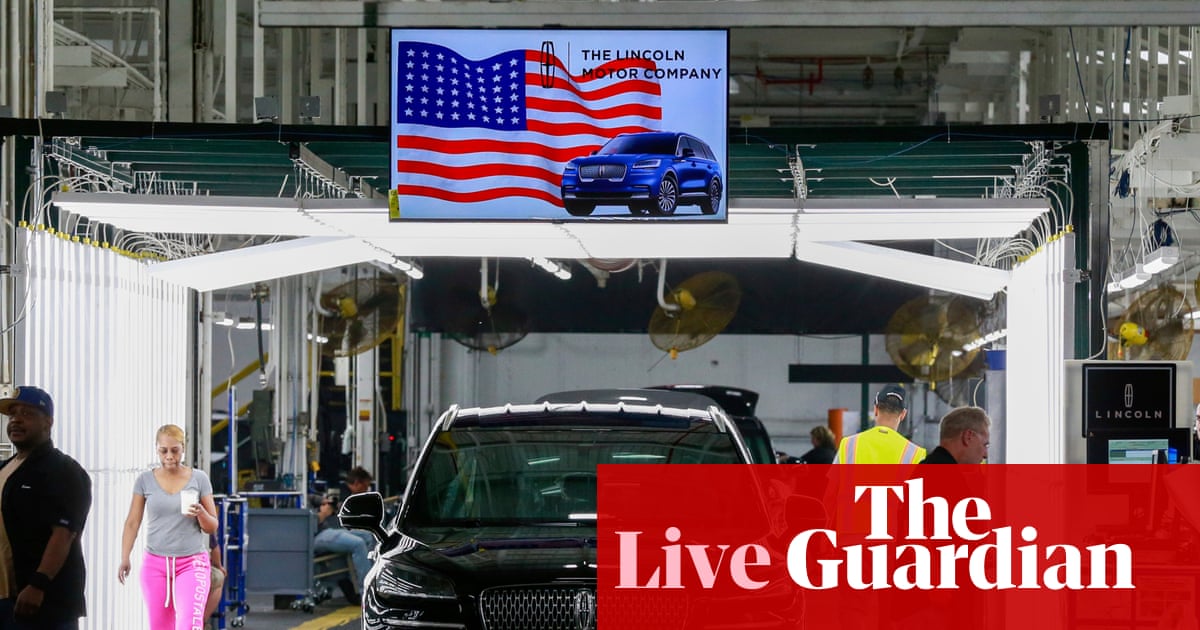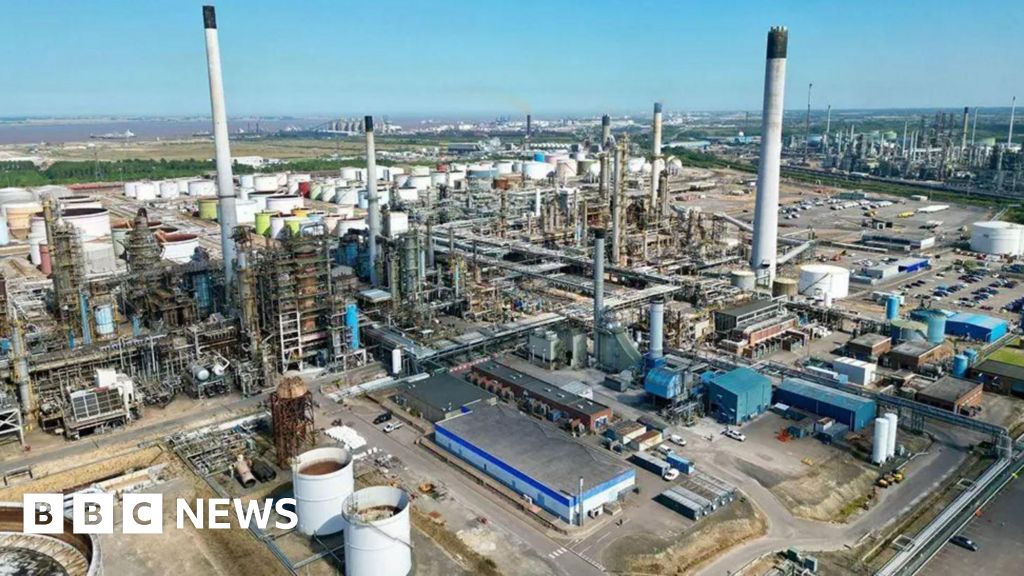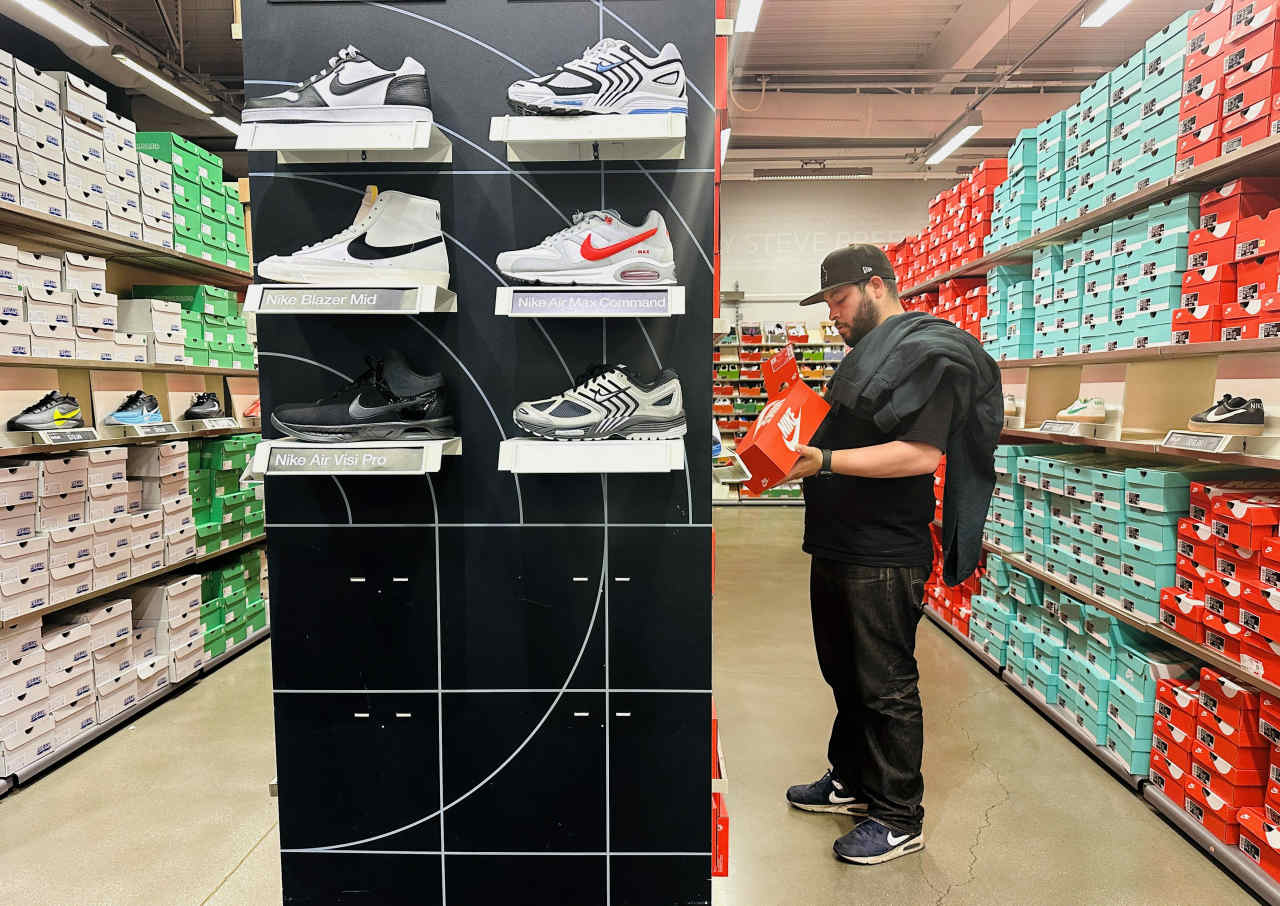US business growth slows as stock piles up at American factories
Just in: Business growth across the US is slowing this month, due to a softening of demand growth across both manufacturing and the services sector.
The latest poll of purchasing managers at American companies has found that levels of unsold stock at US factories has jumped this month, at the fastest rate in the survey’s history.
🇺🇸 US Manufacturing PMI fell to 52.0, with slower growth in output & new orders. Disappointing sales led to the largest build-up of unsold finished goods ever. Services PMI dropped to 53.9 due to weaker domestic demand. Input costs rose to a near 27-month high but firms struggled… pic.twitter.com/20Hm69eSnP
— Augur Infinity (@AugurInfinity) September 23, 2025
S&P Global, which conducts the PMI survey, reports that growth has weakened for a second successive month in September.
Comapnies also blamed tariffs as being the principal cause of further cost increases in September, most evidently in the manufacturing sector.
Chris Williamson, chief business economist at S&P Global Market Intelligence, says:
“Further robust growth of output in September rounds off the best quarter so far this year for US businesses. PMI survey data are consistent with the economy expanding at a 2.2% annualized rate in the third quarter.
However, the monthly profile is one of growth having slowed from its recent peak back in July, and September saw companies also pull back on their hiring. Softening demand conditions are also becoming more widely reported, curbing pricing power.
Although tariffs were again cited as a driver of higher input costs across both manufacturing and services, the number of companies able to hike selling prices to pass these costs on to customers has fallen, hinting at squeezed margins but boding well for inflation to moderate.
This pulled S&P Global’s flash US Composite PMI output index down to 53.6, a three-month low, showing a slowdown in growth.
Key events
Kenvue shares shrug off Trump’s claims

Julia Kollewe
Shares in Tylenol maker Kenvue bounced back today, recovering much of of yesterday’s losses when Donald Trump said pregnant women should limit their use of Tylenol, the US brand name for paracetemol. He claimed it heightens the risk of autism in children – a claim contested by scientists and contradicted by studies.
Wes Streeting, the UK health secretary, firmly rejected the US president’s claims today.
He told ITV’s Lorraine:
“I’ve just got to be really clear about this: there is no evidence to link the use of paracetamol by pregnant women to autism in their children. None.
“In fact a major study was done back in 2024 in Sweden, involving 2.4 million children, and it did not uphold those claims. So I would just say to people watching: don’t pay any attention whatsoever to what Donald Trump says about medicine. In fact, don’t even take my word for it as a politician. Listen to British doctors, British scientists, the NHS.”
Kenvue shares fell more than 7% yesterday after Trump’s intervention, hitting their lowest level since the consumer health company was spun out of US drugmaker Johnson & Johnson in 2023. The stock rose more than 6% in early trading in New York today.
Kenvue has been touted by analysts as a potential takeover target for Haleon, which was itself spun from British phamaceutical giant GSK three years ago. Kenvue is under pressure from activist investors to offload underperforming brands.
AJ Bell investment director Russ Mould said:
“Despite President Trump suggesting a link between Tylenol and autism the company behind the branded paracetamol – Kenvue – did not suffer too much pain in the end overnight, paring earlier losses. Though the shares are down meaningfully since the first murmurings from the administration on a possible link earlier this month.”
Kenvue’s market value has fallen from $40bn in mid-August to less than $35bn today. In July, its board fired chief executive Thibaut Mongon, paving the path for what investors said they hope will be the eventual sale of the company. Kenvue’s other major brands include Listerine and Band Aid.
The jump in stocks of unsold goods at US factories this month are a sign that manufacturing sales growth is disappointing, says S&P Global’s Chris Williamson.
He suggests this could help to “soften inflation in the coming months,” adding:
“The inventory build-up of course also hints at some downside risks to future production. While growth expectations across both manufacturing and services also continue to be dogged by concerns over the political environment, and especially tariffs, September encouragingly saw business sentiment improve in part due to the anticipated beneficial impact of lower interest rates.”
US business growth slows as stock piles up at American factories
Just in: Business growth across the US is slowing this month, due to a softening of demand growth across both manufacturing and the services sector.
The latest poll of purchasing managers at American companies has found that levels of unsold stock at US factories has jumped this month, at the fastest rate in the survey’s history.
🇺🇸 US Manufacturing PMI fell to 52.0, with slower growth in output & new orders. Disappointing sales led to the largest build-up of unsold finished goods ever. Services PMI dropped to 53.9 due to weaker domestic demand. Input costs rose to a near 27-month high but firms struggled… pic.twitter.com/20Hm69eSnP
— Augur Infinity (@AugurInfinity) September 23, 2025
S&P Global, which conducts the PMI survey, reports that growth has weakened for a second successive month in September.
Comapnies also blamed tariffs as being the principal cause of further cost increases in September, most evidently in the manufacturing sector.
Chris Williamson, chief business economist at S&P Global Market Intelligence, says:
“Further robust growth of output in September rounds off the best quarter so far this year for US businesses. PMI survey data are consistent with the economy expanding at a 2.2% annualized rate in the third quarter.
However, the monthly profile is one of growth having slowed from its recent peak back in July, and September saw companies also pull back on their hiring. Softening demand conditions are also becoming more widely reported, curbing pricing power.
Although tariffs were again cited as a driver of higher input costs across both manufacturing and services, the number of companies able to hike selling prices to pass these costs on to customers has fallen, hinting at squeezed margins but boding well for inflation to moderate.
This pulled S&P Global’s flash US Composite PMI output index down to 53.6, a three-month low, showing a slowdown in growth.
Revolut opens global HQ in London

Kalyeena Makortoff
Europe’s largest fintech Revolut has opened the doors to its new global headquarters in the YY London Canary Wharf to much fanfare this afternoon, as bosses announced plans to invest £3bn in the UK and create 1,000 new jobs over the next five years.
The chancellor Rachel Reeves was on site, throwing her support behind the fintech firm, even issuing an official Treasury release about the investment (which averages out to about £600m and 200 jobs per year).
The Treasury said Revolut’s investment “marks its commitment to the UK” where it has grown to a company with over £3bn in revenues and 10,000 staff.
It continues the government’s charm offensive, with ministers desperate to convince Revolut to choose London for its much-awaited stock market debut primary listing.
That is despite growing frustration from CEO Nik Storonsky about further delays to the firm’s UK banking license, which has been approved with restrictions while regulators assess any outstanding issues.
Reeves tried to secure a meeting with watchdogs and regulators earlier this year amid the banking license delay, but was blocked by the Bank of England governor, Andrew Bailey, amid concerns that Reeves was meddling in a process that should be independent from government intervention and influence.
Commenting on the opening of the new HQ, Reeves said:
“The UK is well and truly open for business under this Government.
Through our Leeds Reforms we’re making Britain the best place for financial services companies to do business, pushing us ahead in the global race for investment and putting more money in people’s pockets through the Plan for Change.”
Storonsky said in a statement:
“Today’s opening of our new Global HQ in London is the launchpad for our future. This HQ will be central to driving our growth towards our next milestone of 100 million customers.
“To power that journey from our home market, we are investing £3 billion in the UK over the next five years. This commitment will not only create 1,000 new jobs but will also fuel the innovation from our London hub that will help us deliver on our global ambitions.”
Revolut said on Tuesday that it is also planning to grow its 65m global customer base to of 100m by mid 2027. It comes as it prepares to launch in India and make it first push in Africa starting in South Africa
Meghan, Duchess of Sussex offered MagicFM show

Mark Sweney
Media news: Meghan Markle has been offered her own show on MagicFM after saying in her Netflix TV series that listening to the station was one of the things she missed most about living in the UK.
Last month, the Duchess of Sussex revealed in the second series of her Netflix lifestyle programme, With Love, Meghan, that MagicFM’s easy-listening mix of soft pop and love songs was “one of the things I miss most about the UK”.
On Tuesday, Paul Sylvester, content director at MagicFM and Absolute Radio, revealed on a panel that he has held discussions with Markle’s representatives and made a formal offer.
“We had conversions with the Sussex team and if the Duchess would like to add radio presenter to her CV there is an offer on the table,” he said, speaking at Tuning In, a conference held by UK radio body RadioCentre on Tuesday.
MagicFM has a roster of presenters including Ronan Keating and ex-All Saints singer Nicole Appleton.
Gok Wan and Harriet Scott on the breakfast show and other hosts including Nicki Chapman, Gaby Roslin and Mel Giedroyc.
The main Magic station has a weekly audience of 2.3m, while across the network it attracts 3.6 million listeners.
MagicFM is owned by Bauer Media, the second biggest radio group in the UK, which also owns Hits Radio and Greatest Hits.
“We love that Meghan is a big fan of the station,” said Sylvester, in a statement to the Guardian.
“We’e been in with her team and offered her a show, if she ever wanted one.”
Last month, the Duke and Duchess of Sussex signed a new multi-year film and television deal with Netflix.
Harry and Meghan, who struck a five-year deal in 2020 reportedly worth $100m (£78m) after stepping back from their duties as senior royals, have collaborated with Netflix on a number of projects
Labour MP warns of ‘cash crunch’ danger from JLR shutdown
Labour MP for Tipton and Wednesbury Antonia Bance has warned that Jaguar Land Rover (JLR) suppliers face a “real cash crunch” during the production pause.
Bance has described the extended pause as “hugely worrying”, telling the PA news agency:
“Obviously, JLR are a jewel in the crown of British manufacturing.
“But whilst 34,000 people are employed at JLR, there are over 200,000 in the supply chain to JLR who are obviously experiencing really profound knock-on effects.
“We’re seeing production lines closed across the West Midlands and further afield and suppliers having a real cash crunch.
“There’s a real problem with cashflow which is meaning people, obviously, with production lines down and JLR not paying for what they would normally sell them under contract, they’re not able to pay their staff.
“What this risks is a disintegration of the entire supply chain into JLR, which means that when JLR stands back up again and is ready to go – and it will do, once it’s got over this cyber attack – it may be that some of the supply chain isn’t ready to go if they’ve lost the skilled labour that they rely on, or maybe some of the businesses have gone under.”
Rupee hits record low as U.S. tariff, visa policies heap pressure on India
Back in the markets, India’s currency has hit a record low against the US dollar today.
The rupee was hut by worries about the US trade war, and the consequences of the new $100,000 fee for H-1B visas, which are heavily used by India.
The ruppee fell as low as 88.7975 to the dollar, an alltime low, before ending at 88.755/$.
The rupee has fallen more than 3.5% this year, making it one of the region’s worst performers, Reuters points out.
Last month, Donald Trump imposed 50% tariffs on most US imports from India, over its purchases of discounted Russian oil.
All Amazon Fresh stores in UK to close

Lauren Almeida
Just in: Amazon is preparing to shut down all of its Amazon Fresh stores in the UK, just four years after the US tech company launched its first grocery shop in London.
The company plans to close all 19 Fresh stores, with plans to convert five of these into Whole Foods shops, the US organic grocery chain that it bought in 2017.
Amazon launched its first Fresh store in 2021 in Ealing, west London, that allowed customers to walk out with their shopping without having to use a till.
Instead, shoppers use an app to enter the store and are charged when they leave, with a range of highly sensitive cameras and sensors used to monitor which products they picked up while in store.
However, the concept has struggled as demand for contactless shopping waned at the end of the coronavirus pandemic and Amazon has not been able to pose a serious threat to the likes of Tesco and Sainsbury’s.
More manufacturing gloom: the latest CBI Industrial Trends Survey found that manufacturing output volumes fell in the three months to September.
Worryingly, manufacturers expect output volumes to decline again in the next three months.
The latest CBI Industrial Trends Survey found that manufacturing output volumes fell in the three months to September, at a slower pace to the three months to August. Manufacturers expect output volumes to decline again in the next three months. pic.twitter.com/A2UAo3xZwz
— CBI Economics (@CBI_Economics) September 23, 2025
BoE’s Pill less worried about inflation, as he explains QT dissent
Encouragingly, Bank of England chief economist Huw Pill, is less worried about UK inflation than earlier this year.
Pill has been speaking at the inaugural Pictet Research Institute Symposium 2025 this morning, when he has explained he is now more comfortable with the outlook for price pressures.
Pill said (via Reuters):
“It’s always a question of a balance of risks. And you know, I have been on the side of saying maybe the balance of risks are more on the inflationary side than the disinflationary side.
“I think, through time, and also as markets reprice, that probably is changing. And personally, I’m more comfortable now than I was six, nine, 12 months ago.”
Last month, inflation was unchanged at 3.8%, almost double the Bank’s 2% target.
Pill is one of the more hawkish policymakers at the Bank, and opposed the decision to slow the pace of its quantitative tightening (QT) programme last week.
QT is the process where the Bank cuts the holding of government bonds it build up during the financial crisis and Covid-19. Last year, it conducted £100bn of QT, but now plans to only do £70bn over the next 12 months.
Pill, though, voted for another £100bn, which would have meant actively selling more bonds than the rest of the Bank policymakers were comfortable with.
Today, he explains that he wanted the Bank to maintain “continuity and consistency” in its approach to QT, saying:
What permits QT to operate “in the background” is the scope for Bank Rate (as the “active instrument”) to establish a policy stance that delivers inflation sustainably at target given the impact of QT on yields. With Bank Rate away from its effective lower bound and able to change in either direction, this is the environment in which QT has operated in recent years.
Operating within our established principles has allowed the market to price the impact of QT and has thereby allowed the MPC to set Bank Rate to achieve the inflation target given the impact of QT – as well as a multitude of other factors – on the yield curve, bank behaviour and wider financial and credit decisions.
Today’s OECD forecasts are a sign that “the bad news keeps piling up for the government”, says Kathleen Brooks, research director at XTB.
Brooks explains:
The OECD has said that the UK faces the highest level of inflation of any major economy this year. The OECD predicts that UK inflation rate will rise to 3.5% this year from 2.5% a year ago, and core inflation will rise to 3.7%, well above the G20 average rate.
The OECD has blamed food prices and has also pointed out that high levels of wage inflation is fanning the flames of price increases. This can also date back to the government’s large public sector pay rises, and the increase in the national minimum wage. Although the UK is set to have the second fastest growth rate in the G7 this year, growth has faltered in the second half of the year, and the OECD slashed its forecast for 2026 to a mere 1%, saying that fiscal tightening along with trade tariffs will weigh on the UK economy.
The OECD also urged the chancellor to maintain fiscal headroom to better react to any future shocks, through medium term ‘budgetary adjustment paths’ i.e., spending cuts. The private sector is hoping that Rachel Reeves will listen.
Q: Is the UK at risk of stagflation?
The OECD replies that this is not its working assumption.
It points out that growth is expected to pick up this year, and be around potential, while inflation is expected to come down.
OECD secretary-general Mathias Cormann then warns that an extended trade war will have no winners, and will only have losers
Q: Which countries will be most affected by US tariffs?
OECD chief eonomist Álvaro Pereira says the US, Canada and Mexico are expected to be most affected by these rising trade tensions, because their economies are closely linked.
In the next few months, these countries are due to engage in “important dialogue”, Pereira says, adding it is important that this leads to greater engagement and reduces trade barriers.
Q: Why has the OECD raised its inflation forecast for Australia?
OECD chief economist Álvaro Pereira says it’s only a small uptick, and not a big concern as Australia’s growth is expected to pick up too.
The OECD are now taking questions about their latest economic outlook.
Q: How can Europe close the competitiveness gap with the US?
OECD secretary-general Mathias Cormann says Europe should lift investment, saying higher investment leads to higher productivity growth.
This would also help Europe to benefit from the artificial intelligence boom.



